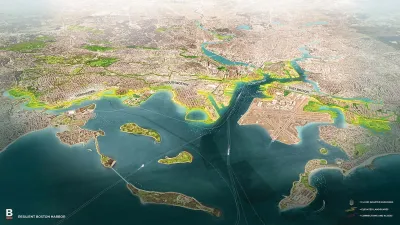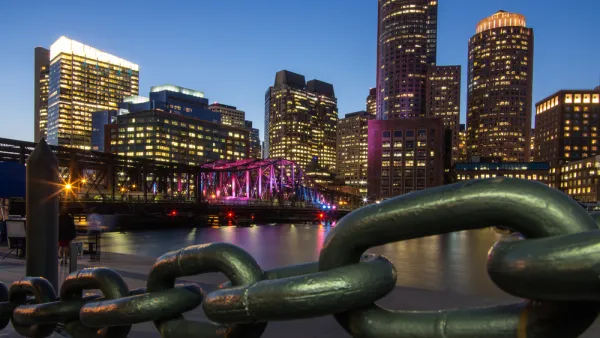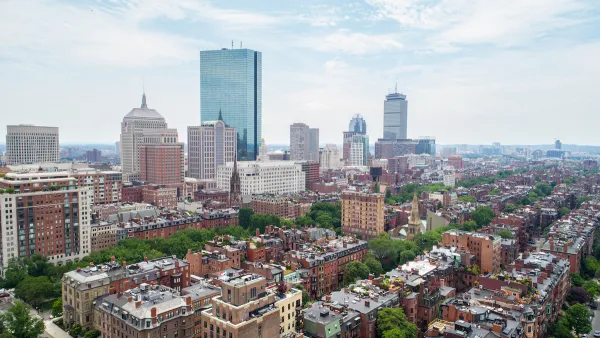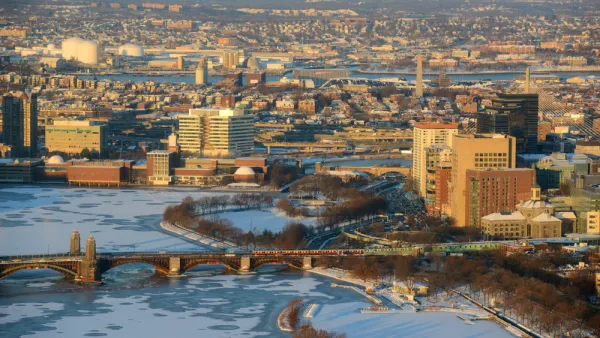It's going to take a lot of funding to build the infrastructure to protect coastal cities from rising seas as climate change takes hold. The city of Boston is starting to experiment with revenue sources that can fund the necessary improvements.

Boston planners are pushing a Climate Resiliency Fund to leverage private development in locations like the city-owned Raymond L. Flynn Marine Park in Seaport for the funding necessary to build protections from rising seas.
According to an article by Andy Rosen, the Climate Resilience Fund is and experiment in infrastructure funding: "asking developers eager to build in the park to help finance a sea wall and other defenses that will protect not just their glimmering new towers of lab space but also the remnants of maritime industry that still operate there."
The Boston Planning & Development Agency is leaning on private sector developers, reports Rosen, to help generate the $124 million needed to construct "the most urgently needed protections for a 191-acre area that in its current state could be prone to flooding as soon as the 2030s and could be largely under water at high tide by the end of the century."
The Climate Resiliency Fund works similarly to how the city "requires commercial developers to contribute a set amount to affordable housing funds, or often to pay for park space or infrastructure upgrades near their projects," according to Rosen.
For more on the city's efforts to prepare for the rising seas of climate change, visit the Climate Ready Boston website, launched on August 9, 2021, lists several initiatives for climate resilience, without mentioning the Climate Resiliency Fund. Rosen's coverage of the Climate Resiliency Fund was published before news that Boston Mayor Kim Janey was rescinding support for the Downtown Harbor Plan championed by the previous mayoral administration.
FULL STORY: Boston is asking developers to help fund a sea wall as the city worries about rising water

Analysis: Cybertruck Fatality Rate Far Exceeds That of Ford Pinto
The Tesla Cybertruck was recalled seven times last year.

National Parks Layoffs Will Cause Communities to Lose Billions
Thousands of essential park workers were laid off this week, just before the busy spring break season.

Retro-silient?: America’s First “Eco-burb,” The Woodlands Turns 50
A master-planned community north of Houston offers lessons on green infrastructure and resilient design, but falls short of its founder’s lofty affordability and walkability goals.

Test News Post 1
This is a summary

Analysis: Cybertruck Fatality Rate Far Exceeds That of Ford Pinto
The Tesla Cybertruck was recalled seven times last year.

Test News Headline 46
Test for the image on the front page.
Urban Design for Planners 1: Software Tools
This six-course series explores essential urban design concepts using open source software and equips planners with the tools they need to participate fully in the urban design process.
Planning for Universal Design
Learn the tools for implementing Universal Design in planning regulations.
EMC Planning Group, Inc.
Planetizen
Planetizen
Mpact (formerly Rail~Volution)
Great Falls Development Authority, Inc.
HUDs Office of Policy Development and Research
NYU Wagner Graduate School of Public Service




























